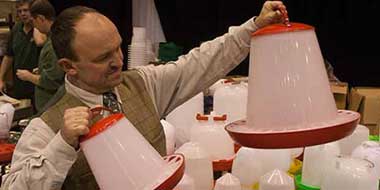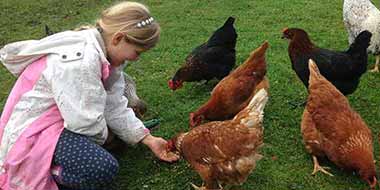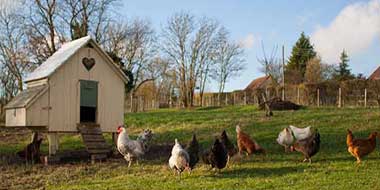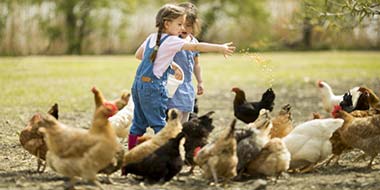
I often get asked whether there are laws on keeping chickens in the back garden. Although most of them are intended for the commercial poultry sector, there are a few but can apply equally to us at home. This information covers regulation in the United Kingdom and the United States (towards the end of this article). Other countries have their own rules and regulations that I don’t know about or cover here.
UK Laws on keeping chickens
First, you should check with your local Council to see whether any local by-laws prevent you from keeping poultry. They will typically have this information on a webpage, so a quick search will usually answer this question. Many allow you to keep poultry, but there are a few that do not.
If your Council doesn’t, please leave me a comment below. I will then compile a list to help others.
Next, if your property is rented, you should check your deeds or ask your landlord whether there are any restrictions or covenants on your property covering livestock. Poultry comes under the ‘livestock’ classification, despite many a desperate chicken keeper trying to argue that their chickens are pets. Many rented properties have covenants to prevent you from keeping poultry and other livestock.
The GB Poultry Register
If you are clear of bye-laws and covenants, if you intend to keep 50 or more birds, you must register your flock with the GB Poultry Register. Whilst this sounds like a lot of birds, ‘poultry’ in this case includes ducks, geese, quail, guinea fowl and so on. Don’t forget to include chicks when you have them since these are counted too.
You register your flock by calling 0800 634 1112 or online on the DEFRA website.
The GB Poultry Register will enable you to receive updates, such as any outbreaks of Avian Influenza (Bird Flu) or housing orders in place.
Neighbours
If you have close neighbours, they can sometimes have concerns that you may have to address before you start to keep chickens. These concerns are usually about vermin, odours or noise, and there are laws you could run into if your neighbours complain.
Let’s look at these issues one by one.
Vermin
Food and water left out are likely to attract vermin such as rats and mice. Both will burrow underneath housing that isn’t raised off the ground sufficiently. Environmental Health can take action against the landowner to eradicate an infestation of vermin under the prevention of damage by pests act.

The answer is to ensure that vermin is kept under control with a good prevention routine. We can easily trap mice, but rats are more complicated.
I have had several episodes with rats but finally know how to deal with them; I have shared quite a long guide: How to Get Rid of Rats.
Odours
Fresh poultry droppings produce unpleasant odours that will attract flies and other insects during the warmer months. Housing should be kept clean, and we should use suitable poultry bedding to absorb moisture from droppings to help odour control.
Poultry produces reasonable amounts of manure that we can compost before using it in the garden. Whilst it makes one of the best manures, it is very high in nitrogen and cannot be used directly on the ground.
Flies aren’t often a problem when housing is kept clean, and compost heaps are turned regularly, but if you are concerned, we can control them using the excellent Red Top Fly Traps which will catch thousands of flies. Remember the traps contain an attractant so place them away from living areas.
If your neighbours can prove that your birds are attracting flies and causing a nuisance, the Environmental Protection Team may get involved.
Noise
Male birds will create the most noise and may cause a nuisance to your neighbours.
Hens will create some noise, especially after laying an egg, which may be enough to upset close neighbours.
If your neighbours complain to the Council, you may find the Environmental Protection department writing to you asking you to take action to avoid causing a nuisance.
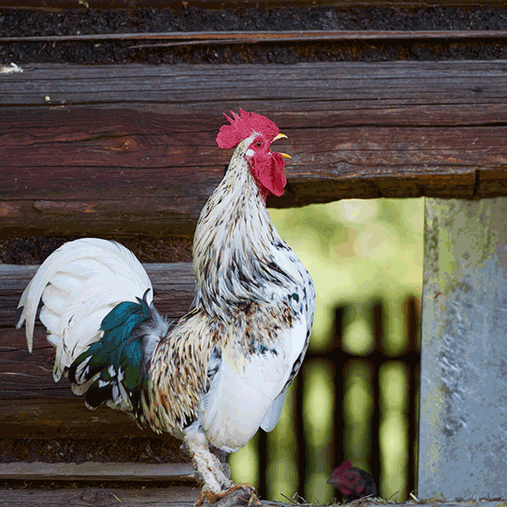
If you live in an urban setting and communicate with your neighbours about your plans, are sensible about hygiene and vermin control, and where you locate your coop, there is usually no reason for them to complain.
A few fresh eggs are usually well received by neighbours once in a while and who knows may give them the bug to start keeping a few hens of their own too!
Planning permission
Chicken coops and runs may require planning permission if they are bigger than regulations allow. It is unusual for the average-sized coop to need planning permission, but you may have to check if you are in any doubt.
The Animal Welfare Act
Not exactly a law on keeping chickens but the Animal Welfare Act 2006 states that it is against the law to be cruel to an animal and you must ensure that the welfare needs of your animals are met. It applies to chickens as well as other domestic animals.
Five freedoms for animal welfare
The Farm Animal Welfare Council has established five freedoms for animal welfare, mainly aimed at commercial establishments. However, it can also apply to your backyard hens since they are classified as livestock.
The five freedoms of animal welfare state that, at all times, you have a duty of care to ensure that your animals are free:
- from hunger and thirst – animals must have access to fresh water and a diet which will maintain health and vigour.
- free from discomfort – an appropriate environment should be provided, including shelter and a comfortable resting area.
- free from pain, injury or disease – you must ensure the prevention of illnesses, or rapid diagnosis and treatment.
- to express normal behaviour – sufficient space, proper facilities and company of the animal’s own kind should all be provided.
- and free from fear and distress – you must provide conditions and treatment which avoid mental suffering.
You can read more about UK regulations on chicken keeping here.
Whilst there aren’t exactly many ‘laws’ on keeping chickens, there is still reasonable and sensible regulation. Since poultry is classed as livestock, these rules apply to backyard laying hens, just as much as to commercial layers in the UK.
US Laws on keeping chickens
In the United States, the rules are different. You will need to check with your city’s zoning or health boards to see whether it is legal to raise chickens.
There is a significant variation between States. Some do not allow you to keep chickens at all; others limit the numbers you can keep, require a permit, or restrict you from owning a rooster because of the noise they will make.
There are even restrictions on the coop size or location, so sometimes proximity to neighbours is a factor.
Most cities that allow you to keep chickens will have ordinances in place that you will need to follow to stay legal, so be sure to read these before you start to raise chickens.
There are groups of would-be poultry keepers in some cities, lobbying for the right to keep backyard poultry.
Before legislation is passed, governors must consider issues surrounding neighbours’, the environment and animal welfare issues.
Michigan State University has published some recommendations that might help if you consider trying to get an ordinance allowing backyard poultry in your city.

